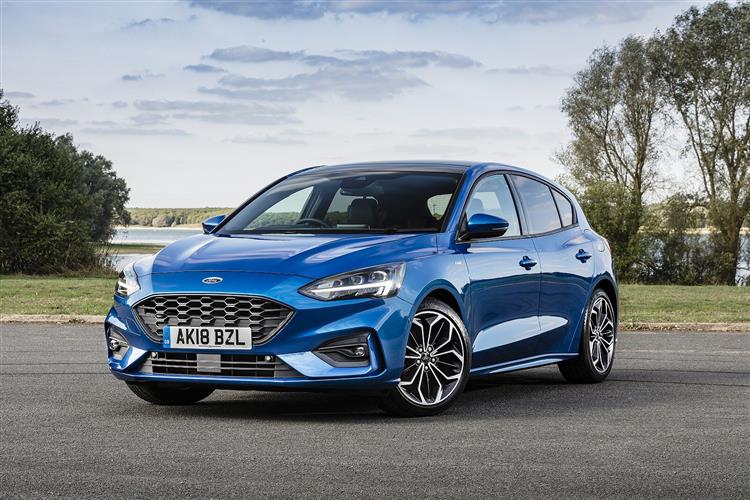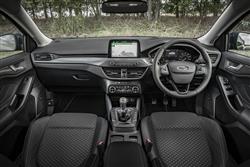How will you view?
This is a sample, showing 30 seconds of each section.
FOCUS GROUP (some text hidden) SECTIONED_new_fordfocus_2018
By Jonathan Crouch
Introductionword count: 99
The fourth generation 'C519'-series Ford Focus launched in 2018 put its maker right back into contention in the family hatchback segment, with smarter looks, much improved interior quality and extra technology. There was also greater efficiency beneath the bonnet from a completely rejuvenated range of engines and what Ford claimed to be class-leading levels of safety. The best part though, was that this car still remained as rewarding to drive as it had always been. The Focus might have grown up in this form, but it certainly didn't lose its spark. Here, we look at the early 2018-2021-era models.
Modelsword count: 12
[petrol] 1.0, 1.5 & 2.3 EcoBoost / [diesel] 1.5 & 2.0 EcoBlue
Historyword count: 495
It's very difficult to over-state the importance of the Focus family hatch to Ford's European business. By the time of the launch of this 'C519'-series MK4 design in 2018, it had been on sale for over two decades with 16 million global sales. For our part of the world, it had proved to be the company's most important market offering since the Model T. To understand this fourth generation version's significance, we'll need to press the rewind button for a moment and shuttle back to 1997. Ford's family hatch contender during this period was the fifth generation Escort, a car so all-encompassingly woeful that the brand was almost embarrassed to sell it. When the time came for a replacement, everyone expected something better. But what we got in the Focus model first launched in 1998 was something much, much more than that, a contender that, at a stroke, offered arguably the biggest step forward in family car design the market had ever seen. Here at last was technology directed firmly at the man in the street who, in this apparently humble family hatchback, could experience a car more entertaining and rewarding to drive than almost anything this side of a sizeable lottery win. It was asking a lot for the MK2 model we saw in 2005 to repeat such a seismic step forward but that second generation Focus was still quite good enough to remain acclaimed as the driver's choice against rival Astras and Golfs that made up for their dynamic failings with a better ride and a more luxurious big car feel. These were attributes the Focus needed too and when it came to developing the MK3 version, first launched early in 2011, then updated in 2015, Ford tried to provide them without compromising the car's class-leading handling. That was also the goal with this more sophisticated MK4 model, announced in the Spring of 2018. It was about the same size as before and though the lighter, stronger bodywork didn't look too different, it clothed an all-new C2 platform that enabled a longer wheelbase that for the first time allowed this car to offer properly class-competitive rear seat room and luggage space. Much had changed beneath the bonnet too, with clever cylinder deactivation for the petrol models and the all-new 1.5-litre three cylinder petrol unit we'd first seen in the Fiesta ST. The diesel engines were new too. So was the much higher quality cabin which featured half the number of previous buttons. On top of all that, the brand claimed class-leading camera-driven safety standards too. This car did, in short, promise the kind of significant step forward that was absolutely necessary for Ford if the brand was to retain its place amongst the sales leaders in this segment. This MK4 Focus was updated with a mild hybrid version of the 1.0-litre EcoBoost petrol unit in 2020; then fully facelifted at the end of 2021. It's the pre-facelift 2018-2021-era models we look at here.
What You Getword count: 424
Here's a car that in this MK4 form certainly grew up - matured - in almost every way. You might, like us, wish that Ford had been a touch more adventurous about this fourth generation Focus model's design, but you can see at a glance that it better meets the key criteria for the kind of car a family hatchback should be. The wheels are further apart, the glass area's larger, the overhangs shorter, all of this part of the brand's 'human-centric' design philosophy. To some extent, that works. Put this 'C519'-series Focus next to its pre-2018 'C346'-series predecessor and it certainly looks a more expensive proposition. There was also an estate model as an alternative to the usual five-door hatch. Inside, Ford hoped buyers would find the ambiance of this fourth generation model much more inviting. To that end, the dashboard was pulled forward and there was a slimmer, lower centre console, plus the new body shell freed up more room for shoulders and knees. As a result, you no longer feel quite so hemmed-in at the wheel, but by the same token, there's also slightly less of the cockpit-style positioning that we rather liked before. You can't fault the cleaner, sharper ergonomics though, aided by a massive 50% reduction in button clutter, with as many functions as possible relocated to the cabin's prominent SYNC 3 infotainment screen that, in keeping with current automotive fashion, sprouts from the top of the dash. All of which is interesting - but perhaps not quite so fundamentally significant as the changes which took place further back in this fourth generation model. The space on offer here certainly doesn't redefine what the family hatchback segment can offer, but at the launch of this MK4 model, it did at least begin to typify it. In a Focus, back seat folk were with this fourth generation design treated much as they would be in a rival Golf, thanks to 56mm more knee clearance, 78mm more legroom and 60mm more shoulder room. The boot also upgraded itself to meet the class standard in 2018, offering 341-litres of capacity if you load to window level - or 375-litres with a tyre repair kit fitted. A typically-specified estate model fitted with a mini-spare offers up to 575-litres. Fold down the 60:40-split rear backrest and between 1,250 and 1,320-litres of space can be freed up in the hatch model, depending on the size of spare wheel the car in question uses. An estate fitted with a mini-spare will give you up to 1,620-litres.
To see the full road test text contact us on 0330 0020 227
Pictures (high res disabled)

.jpg)
|
.jpg)
|
.jpg)
| |||
.jpg)
|
.jpg)
|
.jpg)
| |||
.jpg)
|
.jpg)
|
.jpg)
| |||
.jpg)
|

|
Scoring (subset of scores)
Category: Compact Family Cars
| Performance | |
| Handling | |
| Comfort | |
| Space | |
| Styling, Build, Value, Equipment, Depreciation, Handling, Insurance and Total scores are available with our full data feed. | |





